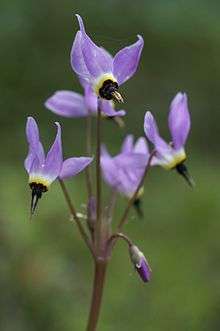Dodecatheon hendersonii
| Dodecatheon hendersonii | |
|---|---|
 | |
| Scientific classification | |
| Kingdom: | Plantae |
| (unranked): | Angiosperms |
| (unranked): | Eudicots |
| (unranked): | Asterids |
| Order: | Ericales |
| Family: | Primulaceae |
| Genus: | Dodecatheon |
| Species: | D. hendersonii |
| Binomial name | |
| Dodecatheon hendersonii A.Gray | |
Dodecatheon hendersonii is a species of flowering plant in the family Primulaceae, native to western North America, from California north to southern British Columbia and Idaho. In California, it occurs in the northwest (except the north coast), the Cascade Range, the Sierra Nevada foothills, the Central Valley, the San Francisco Bay Area, the north Inner South Coast Ranges, and the San Bernardino Mountains. It is generally found in open woodlands, from sea level in British Columbia, up to 1,900 m (6,234 ft) altitude in California. Common names include broad-leaved shooting star, Henderson's shooting star, mosquito bills, and sailor caps.
D. hendersonii is summer deciduous, dying back to the ground after the rains cease. It has basal clumps of leaves, 2–16 cm, with nodding flowers 6–25 mm long on stems 10–30 cm tall. The flowers are magenta to deep lavender to white, with the stamens thrust out and the sepals bent back. It is highly variable and hybridizes with Dodecatheon clevelandii, from which it can be distinguished by its reddish or purplish stem.
Cultivation
It needs good drainage, and needs a dry summer period. Plants germinated from seed may take 3–5 years to produce flowers. For some Dodecatheon, with frequent light fertilization and moisture, dormancy may be delayed, and flowering time may be decreased to 1–2 years. Another technique to speed flowering is to place them in a cooler after dormancy, then bring them to a shadehouse in midsummer. It can be propagated by division in winter. It prefers shade when inland.
This plant has gained the Royal Horticultural Society's Award of Garden Merit.[1]
Uses
The leaves and roots can be eaten when roasted or boiled, but are reported to be poisonous when eaten raw.
References
- ↑ "RHS Plant Selector - Dodecatheon hendersonii". Retrieved 18 June 2013.
Notes
- Jepson Flora Project: Dodecatheon hendersonii
- Plants of British Columbia: Dodecatheon hendersonii
- "Dodecatheon hendersonii". Integrated Taxonomic Information System. Retrieved 16 February 2006.
- ITIS 23962
- Cullina, William, and Cullina, Bill (2000) The New England Wild Flower Society Guide to Growing and Propagating Wildflowers of the United States and Canada, Houghton Mifflin Company, ISBN 0-395-96609-4.
- Las Pilitas Incredible Edibles
- "Wildflowers of Henry W. Coe State Park" brochure, Larry Ulrich, 2002
External links
| Wikimedia Commons has media related to Dodecatheon hendersonii. |